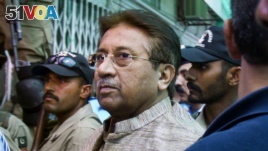17 December, 2019
A court in Pakistan announced Tuesday that former president and military ruler Pervez Musharraf is guilty of high treason. The court sentenced him to death.
The treason charge was tied to Musharraf's declaration of emergency rule in 2007.
It is the first time a Pakistani court has tried and convicted a military leader. Musharraf came to power after the military ousted the government in 1999.

FILE - In this April 20, 2013 photo, Pakistan's former President Pervez Musharraf arrives at an anti-terrorism court in Islamabad, Pakistan. A Pakistani court sentenced the country's former military ruler to death on Tuesday, Dec. 17, 2019.
The treason case has been moving through the courts since 2014 when Musharraf was charged. He has been in Dubai for medical treatment since 2016.
Pakistani justice officials have asked the former president to return and answer questions in court several times. But he has said he could not return for medical reasons.
Earlier this month, from a hospital in Dubai, Musharraf expressed his distrust in the judicial process. He described himself as a victim of it.
The major opposition parties in Pakistan praised the court decision as protection against future military overthrows. The country has spent more than half of its existence under direct military rule.
Bilawal Bhutto Zardari is the leader of the Pakistan People's Party. He is the son of former Prime Minister Benazir Bhutto, who was murdered in 2007. He wrote on Twitter Tuesday: "Democracy is the best revenge."
Pakistan's government, considered close to the military, did not issue an official statement on the conviction. However, at least one government minister expressed concerns about the court's decision.
"We need to unite the country. Why take decisions that divide the nation and its institutions?" wrote Fawad Chaudhry, the minister for science and technology.
Political observers say carrying out the sentence may not be easy in a country where the military is still considered to be Pakistan's most powerful institution.
Pakistanis are discussing the court's decision on Twitter.
Activist Ammar Ali Jan wrote "I oppose death penalty even for criminals like Musharraf. Yet, this decision is imp(ortant) since it challenges the history of impunity for Generals..."
Other Pakistanis disagreed.
"Whatever is happening with him, I think this would be a miscarriage of justice in the history of Pakistan. What he did on 3rd Nov 2007, was it a right or wrong move, that's debatable," tweeted retired army general Ghulam Mustafa.
I'm Jonathan Evans.
VOA News reported this story. Caty Weaver adapted the story for Learning English. George Grow was the editor.
________________________________________________________________
Words in This Story
convict - v. to prove that someone is guilty of a crime in a court of law
revenge - n. the act of doing something to hurt someone because that person did something that hurt you
institution - n. an established organization
challenge - v. to say or show that (something) may not be true, correct, or legal
impunity- n. freedom from punishment, harm, or loss — usually used in the phrase with impunity
We want to hear from you. Write to us in the Comments section, and visit 51VOA.COM.